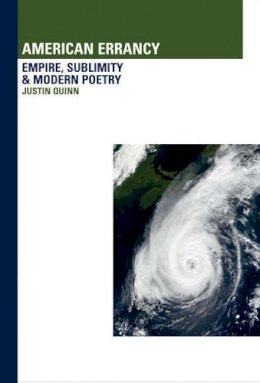8%OFF

Stock image for illustration purposes only - book cover, edition or condition may vary.
American Errancy: Empire, Sublimity and Modern Poetry
Justin Quinn
€ 54.23
€ 49.99
FREE Delivery in Ireland
Description for American Errancy: Empire, Sublimity and Modern Poetry
Hardcover. American Errancy is a wide-ranging study of the connection between ideology and the sublime in the work of twentieth-century poets, all American with two, or perhaps three important exceptions. The poets studied include, Allen Ginsberg, A.R. Ammons, Emerson, Eliot, Hill and many more. Num Pages: 212 pages. BIC Classification: 2ABM; DSBH; DSC. Category: (P) Professional & Vocational; (UP) Postgraduate, Research & Scholarly; (UU) Undergraduate. Dimension: 234 x 156 x 20. Weight in Grams: 449.
American Errancy is a wide-ranging study of the connection between ideology and the sublime in the work of twentieth-century poets, all American with two, or perhaps three important exceptions. The poets chosen are in debate with the Romantic individualism of Emerson - some reject it outright, but the remainder have devoted substantial work to adjusting to the changed circumstances of their century. The link between Romantic individualism and ideological contexts has preoccupied much criticism of American literature in the last twenty years. For the most part, critics arraign this tradition, suggesting that the writers abscond from difficult political dilemmas to the realm of transcendence. In consequence, the sublime as category for thinking about literary texts has been largely abandoned. Emerson's transcendence is considered at best naive, at worst as providing the nascent corporate capitalism of the late nineteenth century with an iconography with which to execute its agenda. Justin Quinn argues that this critical approach distorts the achievement of poets in the twentieth century: many of the poets discussed extend the tradition of Romantic individualism, but they are not ideologically naive in the above sense. Their work anticipated historicist criticism of the 1980s and 1990s as they began to 'socialise' the sublime, and to explore the ways in which the inheritance of Romantic individualism could engage with ideological contexts. For some of the poets, these explorations supported their oppositional politics (i.e., Allen Ginsberg); for others, paradoxically, the explorations supported conservative politics (i.e., A. R. Ammons); others rejected the Emersonian inheritance outright (Eliot, Hill), but that rejection itself has left an enduring mark on their work.
Product Details
Publisher
Univ College Dublin Pr
Number of pages
212
Format
Hardback
Publication date
2005
Condition
New
Number of Pages
212
Place of Publication
Dublin, Ireland
ISBN
9781904558354
SKU
V9781904558354
Shipping Time
Usually ships in 7 to 11 working days
Ref
99-15
About Justin Quinn
Justin Quinn is Associate Professor at the Charles University, Prague. He has published three volumes of poetry, most recently Fuselage (Gallery, 2002) and in the same year UCD Press published his Gathered Beneath the Storm: Wallace Stevens, Nature and Community. He was a founding editor of the Irish poetry magazine Metre, which he edited with David Wheatley for ten years.
Reviews for American Errancy: Empire, Sublimity and Modern Poetry
"T. S. Eliot praised Henry James for having a mind so fine 'that no idea could violate it'. Quinn shows that American poets can deal with ideas without being violated by them. This study ... belongs in collections strong in modern poetry and American studies." CHOICE June 2006 "Justin Quinn's American Errancy: Empire, Sublimity and Modern Poetry - fulfils the promise of the earlier journal publication of the fine chapter it devotes to Allen Ginsberg. Quinn's invigorating introduction constructs a narrative of the ways in which American culture has grounded itself in the sublime while seeking at times to constrain that sublime within a particular vision of society and social institutions; starting from standard Puritan texts, Quinn traces the ideological implications of the interactions of these terms through Emerson, Whitman, Stevens, Moore, Crane, Ralph Ellison, Leslie Marmon Silko, and others. It's a bracing narrative, which dissents from current accounts of this field with great scope and intelligence - Chapters are devoted to an unusually wide range of poets - T. S. Eliot, A. R. Ammons, Amy Clampitt, and Robert Pinsky, as well as Ginsberg, Graham, Thom Gunn, and Geoffrey Hill - and each is stimulating, with the most notable study perhaps that of Ammons which presents, of flaunts, the author of Sphere as a full-blown poet of empire." YWES [The Year's Work in English Studies] Winter 2008
